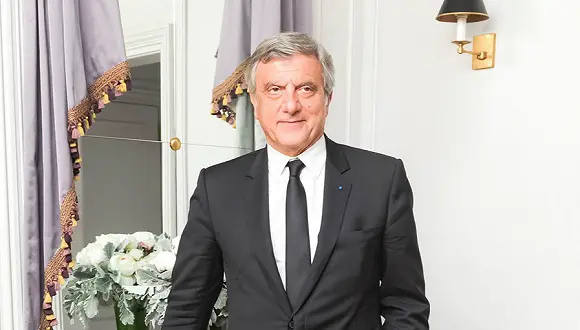The situation in Yemen is like the witches scene in Macbeth: There is too much stuff being thrown into a boiling cauldron. The country is being ripped apart by either a domestic conundrum or by a fierce power politics between Saudi Arabia and Iran.
Yemen has long been one of the world’s most corrupt and most mismanaged states, thanks to its former president, Ali Abdullah Saleh, who ruled the country for 33 long years before he was forced out in 2011. Throughout his tenure, he egocentrically bragged that he was the only one capable of governing this tribal nation. But his politics helped neither himself nor his people.
Yemen's former President Ali Abdullah Saleh (in neck tie) is surrounded by guards as he attends a rally held to mark the 35th anniversary of the establishment of his General People's Congress party in Sanaa, Yemen August 24, 2017.
On Monday, Dec. 4, Saleh was killed by Houthis rebels — those with whom he had been in a convenient marriage for the past three years against the Saudi-backed president, Abedrabbo Mansour Hadi. But his relationship with the Houthis, an offshoot Shiite group called Zaydi, is complicated. In 2004, when Saleh was president, he ordered the Yemeni military to kill Hussein al-Houthi, the leader of the Houthis. Although Saleh himself is a Zaydi, he had no reservations when it came to killing someone from his own sect. And just 48 hours before his assassination by the Houthis, he again shifted sides and extended a hand to the Saudis. The Houthis called it “high treason” and did not allow him a third chance to change sides.
Houthis are known to receive support from Iran and Lebanon’s Hezbollah, and in November 2017, they fired a ballistic missile at Riyadh. Iran denied that it played any role in the attack, and the U.S. now seems to be throwing all its support behind Saudi Arabia to show Iran as the only actor in Yemen creating human tragedy. “Iran is carrying out a number of other destabilizing actions in the region,” Secretary of State Rex Tillerson said yesterday. “And we’ve seen this recently with ballistic missiles being fired from Yemen, which it’s our belief are sourced from Iran – their support for the Houthis, and the destabilizing effect that that has in Yemen.”
A Houthi militant mans a checkpoint as clashes with forces loyal to Yemen's former president Ali Abdullah Saleh continue in Sanaa, Yemen.
But it is not only Iran that destabilizes Yemen; it’s also the Saudis. Even during war, it is against the rules to prevent humanitarian aid to freely flow to areas and people in need. Saudis are basically punishing all Yemenis – starving them to death and preventing health care to reach those in need. World Health Organization - WHO reports there are more than 1 million suspected cholera cases and already over 2,200 Yemenis are killed of this endemic. This could soon threaten the wider region.
What happens next in Yemen may be a mystery, but the Americans’ unyielding support for Saudi Arabia and their decision to turn a blind eye to the impact of blocking ports entry into Yemen is not, to say the least, a winning strategy for the U.S.. People in the region are fed up with this kind of politics. While they are suffering, they have nothing to do but add to their hatred. Iran may not possess the moral high ground, but it is playing the regional game in a smarter way.
A military vehicle used by Houthi fighters is stationed near Tahrir Square as clashes with forces loyal to Yemen's former president Ali Abdullah Saleh continue in Sanaa.
The U.S. and Saudi Arabia may not be happy with Iran’s progress in Iraq, Syria, Yemen and elsewhere in the region. But it is the loss of U.S. soft power that created the vacuum for others to fill in. The only way to reverse this damage is to call on all the actors responsible for this humanitarian crisis — and that very much includes Saudi Arabia. The international community should recognize and highlight the extreme damage done by the Saudi bombings in Yemen, and the U.S. should stop providing military help for Saudi operations in Yemen.
If the end game is to escalate the tension between Saudi Arabia and Iran, even at the high risk of bringing them to the verge of open conflict, this is both irrational and inhumane. The region can’t handle any more. As the European Union’s High Representative, Federica Mogherini, said yesterday next to Tillerson, “IAEA has certified for nine times” that the nuclear agreement with Iran is working. There is no reason for the U.S. to lose its mind over Iran and spare innocent lives at all corners of the Middle East for putting it down.
The article eprinted from CGTN, not necessarily the views of APD.
(CGTN)
 简体中文
简体中文





